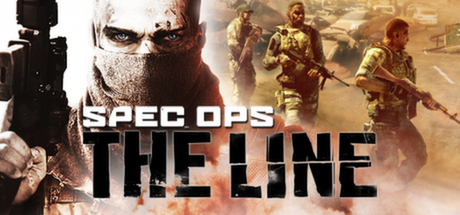
Spec Ops: The Line is an interesting game. It’s pretty short, maybe 10 hours long, with basic shooter gameplay, and it seems like it would be a very stereotypical experience. But its story is very subversive, not just for the genre, but also for the experience of gaming as a storytelling medium. If you haven’t played it yet, I’ll try to keep things spoiler free.
The basic gist is that you’re a special operative sent into Dubai in a near-future scenario where massive dust storms have pretty much destroyed the city, looking for survivors. A couple different factions are fighting, and you and your men get caught up in the middle of everything, trying your best to evacuate the civilians at first, then just to survive.
As I played through it, at first I was a little irritated that the game wasn’t letting me make choices that I knew should have been made by the characters and then blamed me for making those “choices.” This is deliberate: the loading screen text addresses you, the player, for what your character has done. I thought it would be interesting if they let you make other, better choices too, even if the game just ends when you do. Like you can have the “happy” ending by just cutting the experience short, even right after the very first part of the game before anything really bad happens.
But then I read an interview with the creator where he mentions that they actually thought of that, but chose not to do it because they wanted to draw players in through that sense of “maybe if I keep going things will get better” that is so common in real life. They didn’t want it to be that easy for the player, where they would have immediate confirmation that they made the “right” choice. The way to stop things from getting worse in the game is to just… stop playing. Put the controller down. Walk away. Which is so counter-intuitive to what it means to play a game that I think it really drives the point home, and took a lot of guts from the development team.
Usually when creators talks about how they wanted to set an experience that deliberately invokes anger from the player toward the creator, it comes off as just a cheap gimmick or excuse for laziness. In this game, I believe it, and it has made me re-evaluate other things I get angry at in games. Something fairly infamous in games is where they give you dialogue choices, and when you select one what your character says is something far more extreme than what was written. And you go “Well what the fuck, that’s not what I wanted to say!” But that’s life sometimes. You sometimes say things you don’t intend. Things come out wrong. What sounds reasonable in your head gets corrupted by emotions or poor communication skills.
Spec Ops game developers created a game where “winning” has consequences that the player does not intend, which reflects reality. Having objectives that you feel are right and justified, only to regret them later… where you make one decision after another, each which seems reasonable, but look back and realize you should have stopped a long time ago… that happens in real life all the time. Particularly to those who go to war.
If you feel like a game is ever “making” you do do things that you don’t want to do, it can actually be a great moment to empathize with people in situations where they feel pressured to do things for reasons far stronger than just wanting to see how a game ends. It’s the kind of experience that’s very unique to the storytelling medium of video games.

Spelling error report
The following text will be sent to our editors: